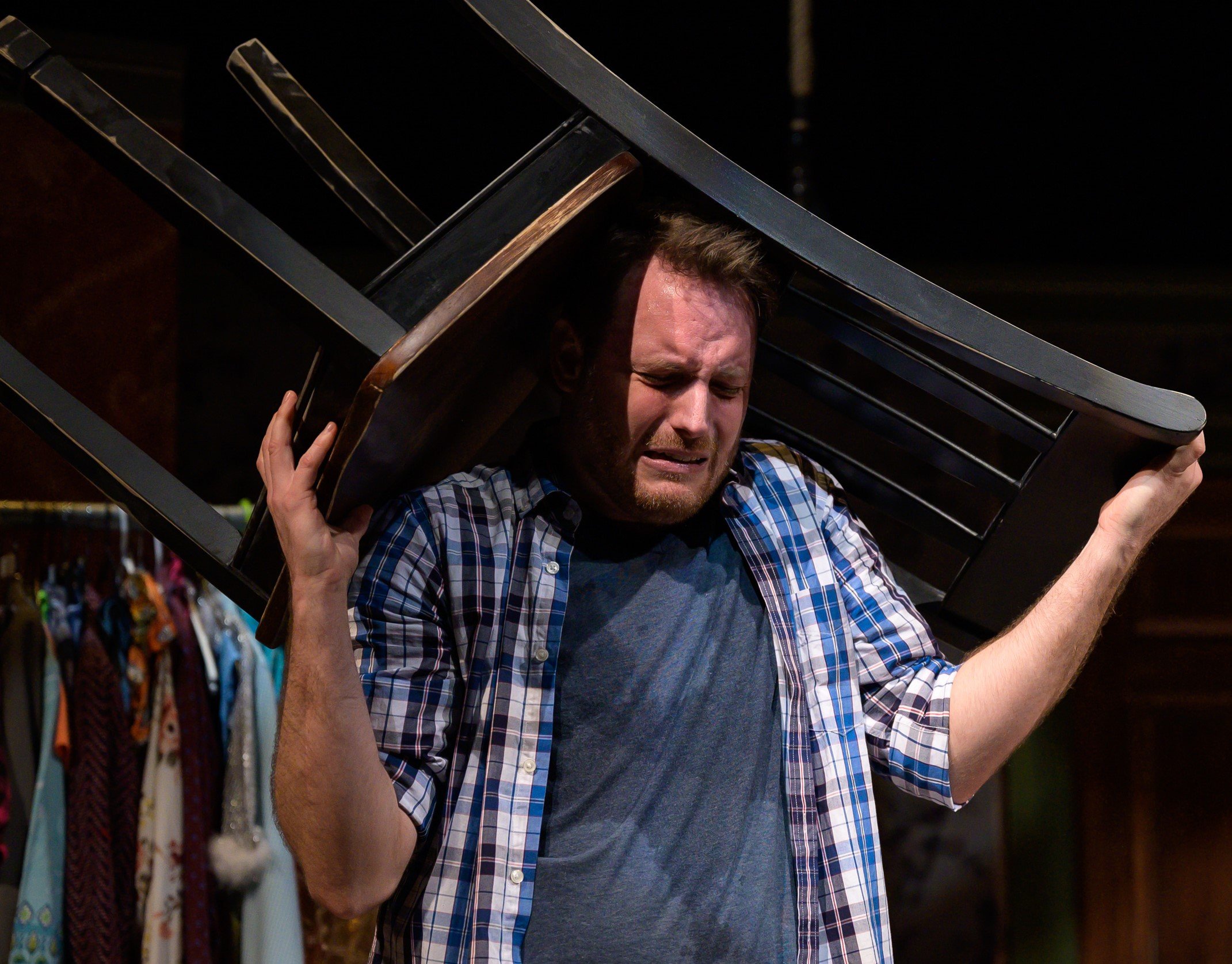Dave Droxler shares his autobiography and his love of Robin Williams in his new solo play.
Dave Droxler makes his living as an actor and voice-over artist, but he is also a gifted impressionist. His 2016 New York Fringe Festival show, Walken on Sunshine, was built around his masterly impersonation of Christopher Walken. Now Droxler has written a solo play, Robin and Me: My Little Spark of Madness, that showcases his equally spot-on impression of his idol Robin Williams.
Jim Carrey, Eddie Izzard, Andy Kaufman, Christian Slater and Jack Nicholson—as channeled by Droxler—also turn up in Robin and Me. And he voices a character named Sal, who’s heard from offstage and sounds exactly like Harvey Fierstein. So there is no doubt about Droxler’s talent at uncannily mimicking voices (and mannerisms).
Inspired by Williams, Droxler says after befriending a little girl with cancer: “I was seeing how laughter really is healing, and how maybe I could become someone that helps another person through their troubles by being funny.”
However, those celebrity appearances don’t particularly sit comfortably alongside the thin personal story that makes up Robin and Me’s plot. The premise is that Robin Williams became Droxler’s imaginary friend/life coach ever since he was entranced by a Mork & Mindy rerun at age 8. At times of strife, Williams would materialize to talk Droxler through his problems and give him advice.
These extended “conversations” with Williams may not have happened as depicted. They seem too stage-ready for what would basically be talking to yourself, with metaphors both spoken and enacted and Williams discussing things in his life and career. The autobiographical part of Robin and Me—which is produced by Abingdon Theatre and directed by its artistic director, Chad Austin—is the childhood-to-present life story Droxler tells.
His story, absent the Williams interludes, may not be extraordinary enough to merit dramatization. Williams provided solace to Droxler amid his difficult home life, the script suggests. But the upbringing he relates wasn’t actually traumatic, and the experiences that upset him are fairly commonplace: hearing his parents fight, losing a grandparent, going through puberty, getting rejected at auditions. “I was around a lot of anxiety-inducing adults,” Droxler states early on, then doesn’t go into detail. He plays his father’s potentially harmful foibles for laughs: “He was your basic blue-collar, union, suburban guy who was a total creature of habit. One of those habits was buying $20 to 40 worth of lottery tickets a day.” And Droxler’s romantic life was anything but dramatic. As portrayed in the show, he and his future wife hit it off right away and had an untroubled courtship (“Robin never had to help me get through any of our dates”).
The play is called Robin and Me: My Little Spark of Madness because, Droxler says on stage, “every good title deserves a strong colon.” Photographs by Grace Copeland.
The one issue that always pained Droxler was his father’s emotional reserve. Many of his chats with Robin have to do with trying to connect with his dad and wishing that his father weren’t so closed off; when they finally have a heart-to-heart (after Droxler has become a father himself), it’s at Robin’s “urging.” Yet the use of Williams as confidant isn’t dramaturgically consequential—anyone else could offer the same insights. There’s a play exploring Droxler’s struggles with his father, and there’s a play that pays homage to Williams (and makes use of his Williams impression), and in Robin and Me they’re not quite soldered together effectively. The other celeb impersonations—Carrey, Nicholson et al.—are just shoehorned in for their entertainment value.
Oh, but Droxler’s impressions are good. And he’s a pleasant stage presence as storyteller. Maybe if he incorporated select personal anecdotes into the story of how Williams inspired him, instead of the other way around, the whole thing would hold together better. A few incidents mentioned in Robin and Me—such as Droxler’s teenage friendship with a young cancer patient and his son’s birth coinciding with Williams’s death—could illustrate how Williams’s influence made a difference in his thinking or behavior, but they are discussed too briefly.
The truly difficult time he recounts with his parents occurs when he’s an adult: His mom has Alzheimer’s, his father has diabetes and doesn’t take his medication properly, and his dad was so careless with their finances that Dave has to get power of attorney. This is all relayed during an extended sequence with Dave and “Robin” enduring a symbolic storm at sea. While lighting designer Dawn Chiang and sound engineer Jesse Starr created excellent effects to simulate the storm, all the hubbub obscures the story itself.
Scenic designer Ant Ma’s work for Robin and Me, likewise, is admirable but possibly more than needed. The set represents both home and backstage, with living-room furniture interspersed with racks of costumes and a dressing-room vanity. Only the opening and closing minutes of the play take place in a theater, though, and it’s hard to see how the multiple chairs hanging on the wall fit in at all.
Robin and Me: My Little Spark of Madness runs through May 14 at Theatre Row (410 W. 42nd St.). Performances are 7 p.m. Wednesday through Saturday, 2 p.m. Saturday and 3 p.m. Sunday; abingdontheatre.org.
Playwright: Dave Droxler
Direction: Chad Austin
Sets: Yi-Hsuan (Ant) Ma
Lighting: Dawn Chiang
Sound: Jesse Starr





